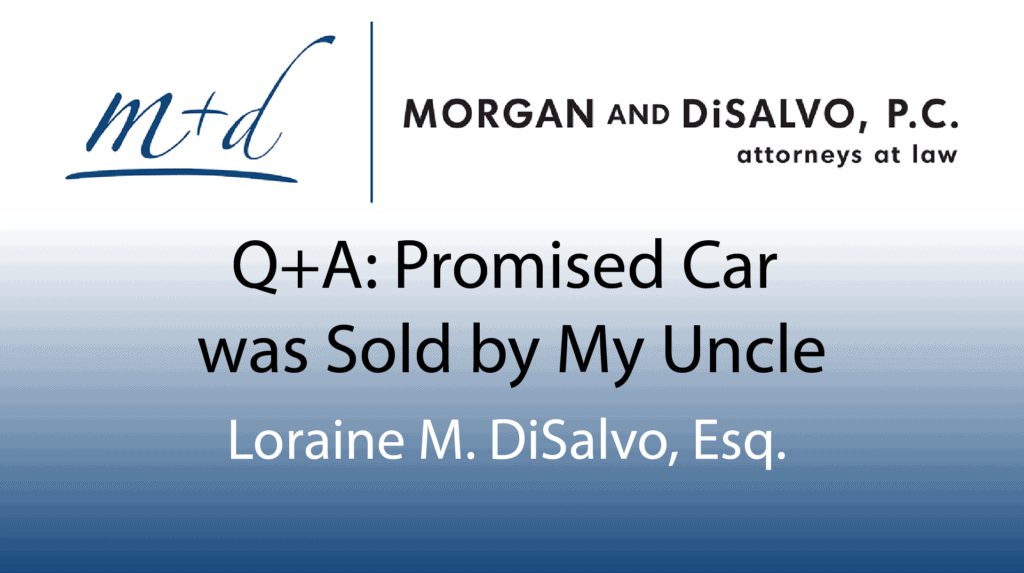Question: My father has Parkinson’s and dementia. He promised me his car but my uncle has sold it. How can I get it back?
Background: Since I was a child, my father promised me his red 1973 Corvette would be mine. From my understanding, he told the entire family about this. However, his brother, my uncle, brokered the sale of the car to one of his friends. I believe my father was taken advantage of, and, as his only child, I feel I have been cheated out of an inheritance.
Loraine’s Answer: I am sorry to hear about your father’s condition (please note that I assume in this answer that he is still living, since your post as I read it does not indicate otherwise). As a fellow car lover, I’m also sorry for your disappointment as to the loss of the car.
That said, you very likely can’t do anything to get the car back, and you very likely have no rights that would have been violated with regard to the sale of the car. Based on the facts as you describe them, you had no right to it as there was simply a verbal promise made. Verbal commitments like this one are not legally binding on your father or anyone else. It was your father’s car, and it was fully within his rights to change his mind and decide to sell it (or to allow your uncle to sell it on his behalf). Believe me, this sort of thing happens all the time within families. Life changes, and things end up sold as a result, even when they’ve been promised to other family members.
As to the question of whether your uncle engaged in anything potentially wrong in helping your father sell the car: The short answer is, “Maybe.” However, without many more facts, it would be impossible to tell and nothing in your actual post raises any red flags for me.
Diagnoses of dementia and Parkinson’s do not automatically mean a person can no longer capably act for himself or make decisions. These conditions simply indicate there are problems with memory and cognition. A person can have either or both conditions and still be legally capable of making decisions such as whether or not to sell a car. If your uncle simply helped your father make and carry out such a decision, and if your father is still capable of making that decision, there is no issue. Even if your father did not make the decision to sell the car himself, if your father gave your uncle power of attorney at a time that he was still capable of doing so, and if your uncle made a reasonable decision to sell the car and did not act unreasonably in arranging the sale to his friend (such as selling the car way too cheaply), then there is likely nothing wrong with the sale. And, if your uncle did not have power of attorney, but just found a friend who wanted to buy the car and then asked your father if he’d be okay with the proposed sale, as long as your father was competent, consented to the sale, and cooperated with it, there is likely nothing wrong with the sale.
The potential issues in a case like this include: whether your father was effectively forced by your uncle to do something he really didn’t want to do; whether your uncle committed fraud of some kind in carrying out the sale (such as forging your father’s signature on the paperwork for the car); or if there is some other similar wrongdoing involved in the sale (such as your uncle keeping the proceeds from the sale instead of giving them to your father or not telling your father about the sale at all). If you really believe that your uncle is committing some kind of abuse with regard to your father, such stealing your father’s assets, or if you believe that your uncle is making poor decisions on your father’s behalf that are leading to your father suffering financial or other damages, you should speak with an attorney who works with contested guardianships and conservatorships to see if there is something you can do to make sure your father is protected.
Key Estate Planning Takeaway: Verbal promises to leave someone a specific asset are not legally enforceable. Unless and until a person has either parted with ownership of an asset or entered a legally binding contract to do something specific with that asset, the person is free to change his mind about the eventual disposition of that asset, including by taking any of the following steps: consenting to a sale of the asset that was brokered by a third party, making a gift of the asset to another person, or granting a third party a power of attorney that the third party then uses to sell the asset. If someone says they intend to leave you a given asset, take that promise with a large grain of salt and don’t count on receiving it. People make this kind of promise all the time and then don’t follow through.
If you have promised to leave someone a given asset, and you don’t want them to be disappointed someday, make sure that you execute a Will or trust and take any other steps to ensure that they receive the asset after your death, or go ahead and legally give or sell them the asset during your lifetime. Otherwise, try not to make such promises, because you will likely just end up with a hurt and disappointed would-be beneficiary when the promised bequest is not made after your death.
This “Q&A with Loraine” blog series features answers from Morgan + DiSalvo Partner Loraine DiSalvo to questions posted on www.avvo.com. A key takeaway from each exchange highlights an important facet of estate planning.


